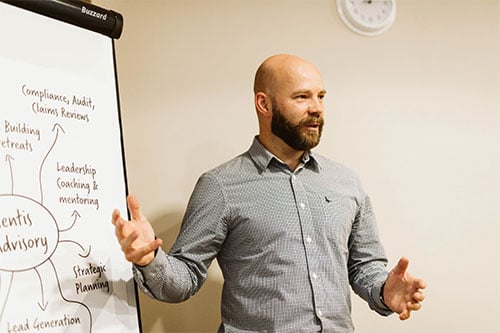

The continuing lockdown within the UK and globally due to the coronavirus pandemic has highlighted the need for organisations and businesses to support their members and employees in an ever-growing variety of ways.
Now, the MGAA has enlisted the expertise of Ian Sutcliffe (pictured above), director of Valentis Advisory and Harry Bliss (pictured right), director of Champion Health, to discuss the mental health an d wellbeing challenges being faced during the coronavirus crisis.
d wellbeing challenges being faced during the coronavirus crisis.
Having been an insurance professional for nearly 30 years, Sutcliffe understands the imperative of raising awareness about mental health issues both in wider society and in the workplace. For the first 25 years of his career in the sector, he said, talking about mental health was a taboo subject but in recent years he has noted that conversations about this complex topic are becoming more commonplace.
It has become almost a daily topic of conversation among the upcoming generation, Sutcliffe said, and one of his biggest fears from a workplace perspective if that if employers do not catch up with the teenagers coming up into the industry then the sector will be in trouble when they hit the workplace in the next five to seven years.
There are very few statistics relating to the insurance sector specifically when it comes to mental health issues, Sutcliffe said, but from looking at the sector as a microcosm of the UK it is estimated that there are around 852,000 days lost to mental health crises a year and that the cost to the sector is between £655 million and £937 million.
“If that was any other issue that we face in our sector, such as fraud which costs the UK insurance industry £1.3 billion per annum, we’d be doing something about it,” he said. “And coming back to the point around the next generation coming into the workplace, 65% of young people, aged 16 to 25 say that they feel anxious or stressed, often or always, according to the Prince’s Trust Youth Index survey from last year. So, not only have we got an issue in the sector at the moment, but we’ve got an issue coming down the line.”
This is an important topic to deal with not only for the individual struggling but also for the long-term viability of a business, Sutcliffe said, and the need to take action has been heightened by the pandemic as many people are experiencing increased levels of anxiety and stress. Bliss agreed that mental health and wellbeing has never been so important within society as it is at this time. The data that has come out since lockdown shows a 37% increase in mental health problems, he said, and the anticipated statistics around suicide are estimated to increase significantly.
Organisations need not only to be able to identify the problems within their employees when it comes to wellbeing, Bliss said, but also to focus on the solution. This is essential to generate a productive workforce who are able to cope with change, he said – something that is of particular importance at the moment when so much change is occurring so quickly.
“Let’s make no bones about it,” Bliss said, “COVID-19 is a threat to us and our society, so it’s perfectly normal to feel anxious during this period… What we need to do is be able to accept the anxiety but also find ways of coping with this change.”
Champion Health has developed ‘the CHAMPIONS framework’, he outlined, a guideline developed by academics and GPs across the UK which details nine key steps designed to help employees optimise their mental wellbeing.
Bliss outlined how, following these nine steps will help enable an employee to optimise their own mental health which will, in turn, allow them to positively impact the mental well-being of those around them.
“It’s not weak to speak,” he said, “and I believe that’s actually one of the reasons why, in the insurance industry there’s one of the greatest costs to organisations from poor mental health, and that’s partly because there is a ‘toughen up’ culture that we need to look to break down. And what we know from any culture that’s high performing, from Liverpool in the sporting field to Google in the business field, we need to create psychologically safe environments for us to thrive in.”
